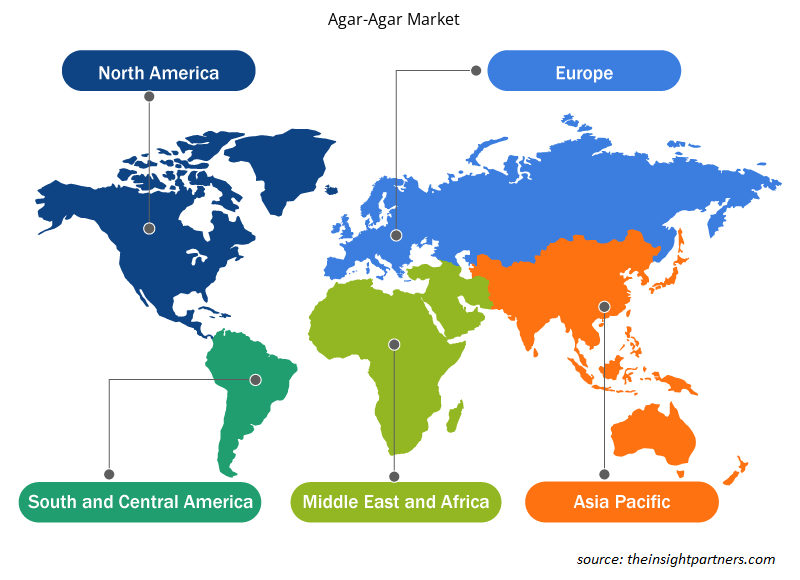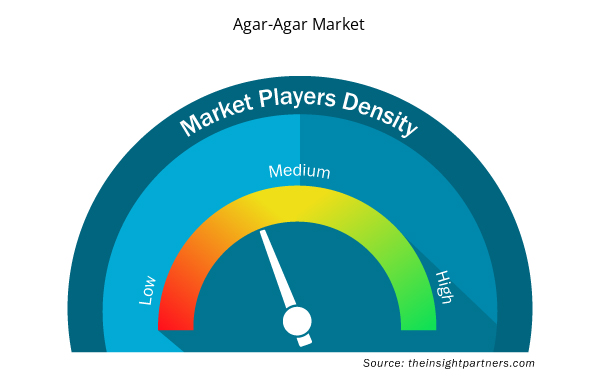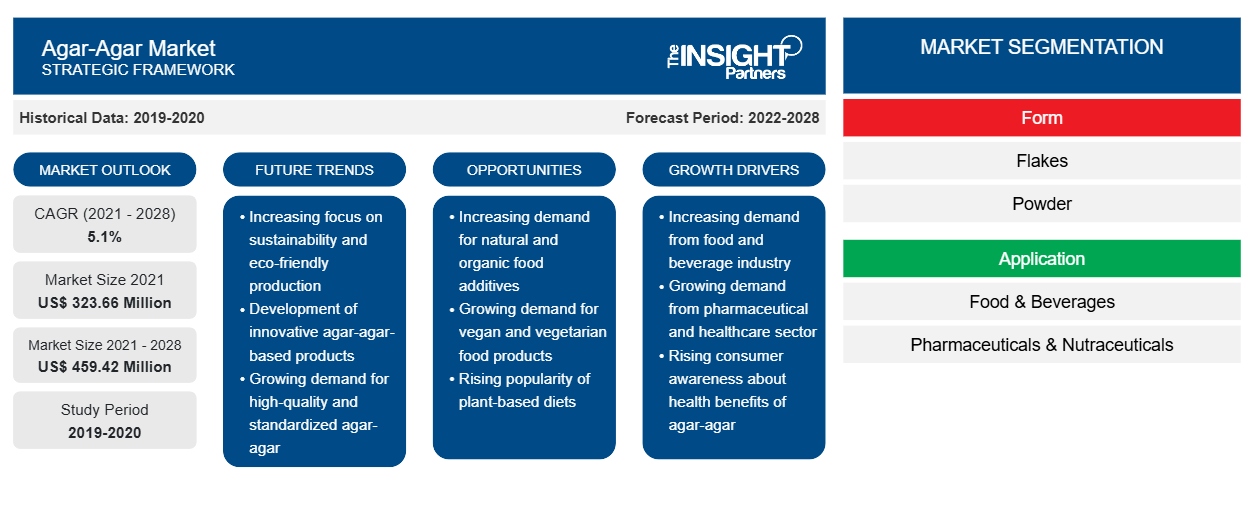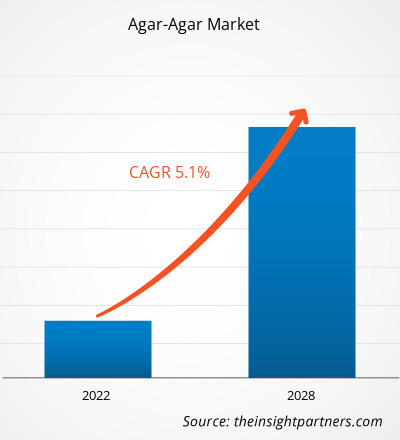Se espera que el mercado crezca de US$ 323.657,68 mil en 2021 a US$ 459.415,30 mil en 2028; se estima que crecerá a una CAGR de 5,1% de 2021 a 2028.
El agar-agar es uno de los sustitutos vegetarianos más populares de la gelatina . Se obtiene a partir de algas rojas, especialmente Glacaralia y Gelidium. El rendimiento del agar-agar es mayor cuando se extrae de Glacaralia y Gelidium que de otras especies. Por lo tanto, estas especies se utilizan comercialmente para la extracción de agar-agar. El agar-agar tiene excelentes propiedades gelificantes. Además, tiene un punto de fusión más alto que otros agentes gelificantes. Por lo tanto, proporciona una alta estabilidad térmica a los productos alimenticios. Ayuda a extender la vida útil de los productos de panadería. La creciente demanda de agar-agar como agente gelificante y espesante por parte de los fabricantes de alimentos y bebidas está impulsando el crecimiento del mercado del agar-agar .
En 2020, la región de Asia y el Pacífico tuvo la mayor participación en el mercado mundial de agar-agar; se espera que crezca significativamente durante el período de pronóstico. China, Japón e Indonesia se encuentran entre los principales países productores de algas marinas. Por lo tanto, la disponibilidad de materias primas necesarias para la fabricación de agar-agar en la región está impulsando el crecimiento del mercado de agar-agar de Asia y el Pacífico. Además, se prevé que la creciente inclinación de la mayoría de la población de la región hacia el veganismo impulse la demanda de agar-agar, ya que se puede utilizar de manera eficaz en productos alimenticios veganos.
Personalice este informe según sus necesidades
Obtendrá personalización en cualquier informe, sin cargo, incluidas partes de este informe o análisis a nivel de país, paquete de datos de Excel, así como también grandes ofertas y descuentos para empresas emergentes y universidades.
- Obtenga las principales tendencias clave del mercado de este informe.Esta muestra GRATUITA incluirá análisis de datos, desde tendencias del mercado hasta estimaciones y pronósticos.
Impacto de la pandemia de COVID-19 en el mercado de Agar-Agar
El brote de COVID-19 afectó a varias industrias debido a los confinamientos, cierres comerciales e interrupciones de la cadena de suministro. Hubo un impacto mixto de la pandemia en el mercado de agar-agar. Inicialmente, debido a los confinamientos y cierres comerciales, los fabricantes enfrentaron escasez de materias primas y mano de obra, lo que afectó su producción y suministro. Sin embargo, a medida que las personas se vuelven más conscientes de la salud, prefieren productos que mejoren la salud. El agar-agar se usa ampliamente en varios productos farmacéuticos y nutracéuticos. Este factor impactó positivamente el crecimiento del mercado, ya que la industria farmacéutica y nutracéutica experimentó un auge significativo en 2020. Además, muchas naciones están vacunadas y los gobiernos han relajado las restricciones impuestas a la fabricación y el comercio. Se espera que todos estos factores impulsen el crecimiento del mercado de agar-agar durante el período de pronóstico.
Perspectivas del mercado
Es probable que el desarrollo de productos abra nuevas oportunidades en el mercado del agar-agar
Los fabricantes de agar-agar se están centrando en el desarrollo de productos innovadores para satisfacer las cambiantes necesidades de los consumidores. Están realizando importantes inversiones en investigación y desarrollo para diferenciar sus productos de sus competidores y conservar su cuota de mercado. Por ejemplo, Gelita AG desarrolló láminas de agar-agar en julio de 2019. Inicialmente, el agar-agar estaba disponible en formato de polvo y copos. Sin embargo, Gelita AG desarrolló láminas de agar-agar utilizando una nueva tecnología de producción, y el producto es mejor que el agar-agar en polvo o en copos en varios aspectos. Elimina la incertidumbre de las medidas de cuchara y las conversiones complejas entre soluciones en polvo, lo que facilita su uso en diferentes preparaciones culinarias. Se prevé que estas innovaciones de los actores clave que operan en el mercado ofrezcan oportunidades lucrativas en el mercado del agar-agar durante el próximo período.
Información sobre formularios
Según la forma, el mercado del agar-agar se segmenta en polvo, copos y otros. El segmento de polvo tuvo la mayor participación en el mercado y se proyecta que crezca a la CAGR más rápida durante el período de pronóstico. El agar-agar generalmente está disponible en formato en polvo. El agar-agar en polvo se puede incorporar cómodamente en varias formulaciones. Además, es fácil de almacenar. El polvo de agar-agar se usa en varias mezclas secas, como mezclas de panadería seca, mezclas de sopas y mezclas de gelatina. Actúa como agente espesante y gelificante. La creciente demanda de polvo de agar-agar para la fabricación de diversos alimentos y bebidas impulsa el crecimiento del segmento.
Información sobre aplicaciones
Según la aplicación, el mercado está segmentado en alimentos y bebidas, productos farmacéuticos y nutracéuticos, y otros. El segmento de alimentos y bebidas representó la mayor participación de mercado en el mercado de agar-agar en 2020; sin embargo, se proyecta que el segmento de productos farmacéuticos y nutracéuticos crezca a la CAGR más rápida durante el período de pronóstico. El agar-agar actúa como un supresor del apetito y se utiliza en suplementos que ayudan a perder peso. También se utiliza en suplementos que mejoran la salud digestiva, ya que absorbe y elimina toxinas de los intestinos y el tracto gastrointestinal. Además, se utiliza en suplementos que mejoran la salud ósea. Las crecientes aplicaciones del agar-agar en la industria farmacéutica y nutracéutica están impulsando el crecimiento del mercado.
Los actores clave que operan en el mercado del agar-agar incluyen a Agar Sari Jaya; Agar Swallow Indonesia; Gino Biotech; Hugestone Enterprise Co., Ltd.; Justchem International Limited; Meron; Pt. Agarindo Bogatama; Pt. Kappa Carrageenan Nusantara; Pt. Surya Indoalgas; y Roland Foods, LLC. Estos actores se dedican al desarrollo de productos innovadores para satisfacer las tendencias emergentes de los consumidores. Además, se centran en proporcionar productos de alta calidad a sus consumidores para conservar su participación en el mercado.
Perspectivas regionales del mercado de agar-agar
Los analistas de Insight Partners explicaron en detalle las tendencias y los factores regionales que influyen en el mercado de agar-agar durante el período de pronóstico. Esta sección también analiza los segmentos y la geografía del mercado de agar-agar en América del Norte, Europa, Asia Pacífico, Oriente Medio y África, y América del Sur y Central.

- Obtenga los datos regionales específicos para el mercado de agar-agar
Alcance del informe sobre el mercado de agar-agar
| Atributo del informe | Detalles |
|---|---|
| Tamaño del mercado en 2021 | US$ 323,66 millones |
| Tamaño del mercado en 2028 | US$ 459,42 millones |
| CAGR global (2021-2028) | 5,1% |
| Datos históricos | 2019-2020 |
| Período de pronóstico | 2022-2028 |
| Segmentos cubiertos | Por formulario
|
| Regiones y países cubiertos | América del norte
|
| Líderes del mercado y perfiles de empresas clave |
|
Densidad de actores del mercado de agar-agar: comprensión de su impacto en la dinámica empresarial
El mercado del agar-agar está creciendo rápidamente, impulsado por la creciente demanda de los usuarios finales debido a factores como la evolución de las preferencias de los consumidores, los avances tecnológicos y una mayor conciencia de los beneficios del producto. A medida que aumenta la demanda, las empresas amplían sus ofertas, innovan para satisfacer las necesidades de los consumidores y aprovechan las tendencias emergentes, lo que impulsa aún más el crecimiento del mercado.
La densidad de actores del mercado se refiere a la distribución de las empresas o firmas que operan dentro de un mercado o industria en particular. Indica cuántos competidores (actores del mercado) están presentes en un espacio de mercado determinado en relación con su tamaño o valor total de mercado.
Las principales empresas que operan en el mercado de Agar-Agar son:
- BIOTECNOLOGÍA GINO
- CV. AGAR SARI JAYA
- PT. Trago de agar
- Empresa Hugestone, Ltd.
- JUSTCHEM INTERNACIONAL LIMITADA
Descargo de responsabilidad : Las empresas enumeradas anteriormente no están clasificadas en ningún orden particular.

- Obtenga una descripción general de los principales actores clave del mercado de Agar-Agar
Informe Destacado
- Tendencias progresivas de la industria en el mercado del agar-agar para ayudar a los actores a desarrollar estrategias efectivas a largo plazo
- Estrategias de crecimiento empresarial adoptadas por los mercados desarrollados y en desarrollo
- Análisis cuantitativo del mercado del agar-agar de 2019 a 2028
- Estimación de la demanda mundial de agar-agar
- Análisis de las cinco fuerzas de Porter para ilustrar la eficacia de los compradores y proveedores que operan en la industria
- Avances recientes para comprender el escenario competitivo del mercado
- Tendencias y perspectivas del mercado, así como factores que impulsan y restringen el crecimiento del mercado del agar-agar
- Asistencia en el proceso de toma de decisiones destacando las estrategias de mercado que sustentan el interés comercial, lo que conduce al crecimiento del mercado.
- El tamaño del mercado de agar-agar en varios nodos
- Descripción detallada y segmentación del mercado, así como la dinámica de la industria del agar-agar.
- Tamaño del mercado de agar-agar en diversas regiones con prometedoras oportunidades de crecimiento
- Análisis histórico (2 años), año base, pronóstico (7 años) con CAGR
- Análisis PEST y FODA
- Tamaño del mercado Valor/volumen: global, regional, nacional
- Industria y panorama competitivo
- Conjunto de datos de Excel



Report Coverage
Revenue forecast, Company Analysis, Industry landscape, Growth factors, and Trends

Segment Covered
This text is related
to segments covered.

Regional Scope
North America, Europe, Asia Pacific, Middle East & Africa, South & Central America

Country Scope
This text is related
to country scope.
Preguntas frecuentes
Surging demand for agar-agar in food & beverages industry and growing applications in pharmaceuticals & nutraceuticals are some of the key driving factors for agar-agar market.
Based on application, the pharmaceutical & nutraceutical is the fastest growing segment. Agar-Agar is a soluble dietary fiber and is used as a mild laxative in treating malfunctions of the digestive tract for its swelling properties. It is also used as a retarding agent and carrier in managing medicines, antibiotics, and vitamins.
Asia-Pacific accounted for the largest share of the global agar-agar market. Seaweed is produced in large quantities in Asian countries, such as China. Agar is far more cost-effective than gelatin, which has led to a surge in its use in various culinary products across the region.
Based on form, the powder segment accounted for the largest revenue share because agar-agar powder is more stable and easier to produce and pack than other types such as flakes, Bars. Powdered dry agar-agar is soluble in water and other solvents at a temperature ranging from 95°C to 100°C.
Manufacturers of agar-agar are significantly investing in research and development to improve existing products and develop new products. These companies are adopting product innovation strategies to differentiate their brands in the minds of consumers, boost their revenues, and fulfill the requirements of potential consumers. Such innovations by prominent companies are projected to offer lucrative growth opportunities to the agar-agar market players over the forecast period
The major players operating in the global agar-agar market are Agar Sari Jaya; Agar Swallow Indonesia; Gino Biotech; Hugestone Enterprise Co., Ltd.; Justchem International Limited; Meron; Pt. Agarindo Bogatama; Pt. Kappa Carrageenan Nusantara; Pt. Surya Indoalgas; and Roland Foods, LLC
Trends and growth analysis reports related to Food and Beverages : READ MORE..
The List of Companies - Agar-Agar Market
- GINO BIOTECH
- CV. AGAR SARI JAYA
- PT. Agar Swallow
- HUGESTONE ENTERPRISE CO., LTD
- JUSTCHEM INTERNATIONAL LIMITED
- Meron Group
- PT. AGARINDO BOGATAMA
- PT Kappa Carrageenan Nusantara
- PT SURYA INDOALGAS
- ROLAND FOODS, LLC
The Insight Partners performs research in 4 major stages: Data Collection & Secondary Research, Primary Research, Data Analysis and Data Triangulation & Final Review.
- Data Collection and Secondary Research:
As a market research and consulting firm operating from a decade, we have published and advised several client across the globe. First step for any study will start with an assessment of currently available data and insights from existing reports. Further, historical and current market information is collected from Investor Presentations, Annual Reports, SEC Filings, etc., and other information related to company’s performance and market positioning are gathered from Paid Databases (Factiva, Hoovers, and Reuters) and various other publications available in public domain.
Several associations trade associates, technical forums, institutes, societies and organization are accessed to gain technical as well as market related insights through their publications such as research papers, blogs and press releases related to the studies are referred to get cues about the market. Further, white papers, journals, magazines, and other news articles published in last 3 years are scrutinized and analyzed to understand the current market trends.
- Primary Research:
The primarily interview analysis comprise of data obtained from industry participants interview and answers to survey questions gathered by in-house primary team.
For primary research, interviews are conducted with industry experts/CEOs/Marketing Managers/VPs/Subject Matter Experts from both demand and supply side to get a 360-degree view of the market. The primary team conducts several interviews based on the complexity of the markets to understand the various market trends and dynamics which makes research more credible and precise.
A typical research interview fulfils the following functions:
- Provides first-hand information on the market size, market trends, growth trends, competitive landscape, and outlook
- Validates and strengthens in-house secondary research findings
- Develops the analysis team’s expertise and market understanding
Primary research involves email interactions and telephone interviews for each market, category, segment, and sub-segment across geographies. The participants who typically take part in such a process include, but are not limited to:
- Industry participants: VPs, business development managers, market intelligence managers and national sales managers
- Outside experts: Valuation experts, research analysts and key opinion leaders specializing in the electronics and semiconductor industry.
Below is the breakup of our primary respondents by company, designation, and region:

Once we receive the confirmation from primary research sources or primary respondents, we finalize the base year market estimation and forecast the data as per the macroeconomic and microeconomic factors assessed during data collection.
- Data Analysis:
Once data is validated through both secondary as well as primary respondents, we finalize the market estimations by hypothesis formulation and factor analysis at regional and country level.
- Macro-Economic Factor Analysis:
We analyse macroeconomic indicators such the gross domestic product (GDP), increase in the demand for goods and services across industries, technological advancement, regional economic growth, governmental policies, the influence of COVID-19, PEST analysis, and other aspects. This analysis aids in setting benchmarks for various nations/regions and approximating market splits. Additionally, the general trend of the aforementioned components aid in determining the market's development possibilities.
- Country Level Data:
Various factors that are especially aligned to the country are taken into account to determine the market size for a certain area and country, including the presence of vendors, such as headquarters and offices, the country's GDP, demand patterns, and industry growth. To comprehend the market dynamics for the nation, a number of growth variables, inhibitors, application areas, and current market trends are researched. The aforementioned elements aid in determining the country's overall market's growth potential.
- Company Profile:
The “Table of Contents” is formulated by listing and analyzing more than 25 - 30 companies operating in the market ecosystem across geographies. However, we profile only 10 companies as a standard practice in our syndicate reports. These 10 companies comprise leading, emerging, and regional players. Nonetheless, our analysis is not restricted to the 10 listed companies, we also analyze other companies present in the market to develop a holistic view and understand the prevailing trends. The “Company Profiles” section in the report covers key facts, business description, products & services, financial information, SWOT analysis, and key developments. The financial information presented is extracted from the annual reports and official documents of the publicly listed companies. Upon collecting the information for the sections of respective companies, we verify them via various primary sources and then compile the data in respective company profiles. The company level information helps us in deriving the base number as well as in forecasting the market size.
- Developing Base Number:
Aggregation of sales statistics (2020-2022) and macro-economic factor, and other secondary and primary research insights are utilized to arrive at base number and related market shares for 2022. The data gaps are identified in this step and relevant market data is analyzed, collected from paid primary interviews or databases. On finalizing the base year market size, forecasts are developed on the basis of macro-economic, industry and market growth factors and company level analysis.
- Data Triangulation and Final Review:
The market findings and base year market size calculations are validated from supply as well as demand side. Demand side validations are based on macro-economic factor analysis and benchmarks for respective regions and countries. In case of supply side validations, revenues of major companies are estimated (in case not available) based on industry benchmark, approximate number of employees, product portfolio, and primary interviews revenues are gathered. Further revenue from target product/service segment is assessed to avoid overshooting of market statistics. In case of heavy deviations between supply and demand side values, all thes steps are repeated to achieve synchronization.
We follow an iterative model, wherein we share our research findings with Subject Matter Experts (SME’s) and Key Opinion Leaders (KOLs) until consensus view of the market is not formulated – this model negates any drastic deviation in the opinions of experts. Only validated and universally acceptable research findings are quoted in our reports.
We have important check points that we use to validate our research findings – which we call – data triangulation, where we validate the information, we generate from secondary sources with primary interviews and then we re-validate with our internal data bases and Subject matter experts. This comprehensive model enables us to deliver high quality, reliable data in shortest possible time.


 Obtenga una muestra gratuita de este informe
Obtenga una muestra gratuita de este informe